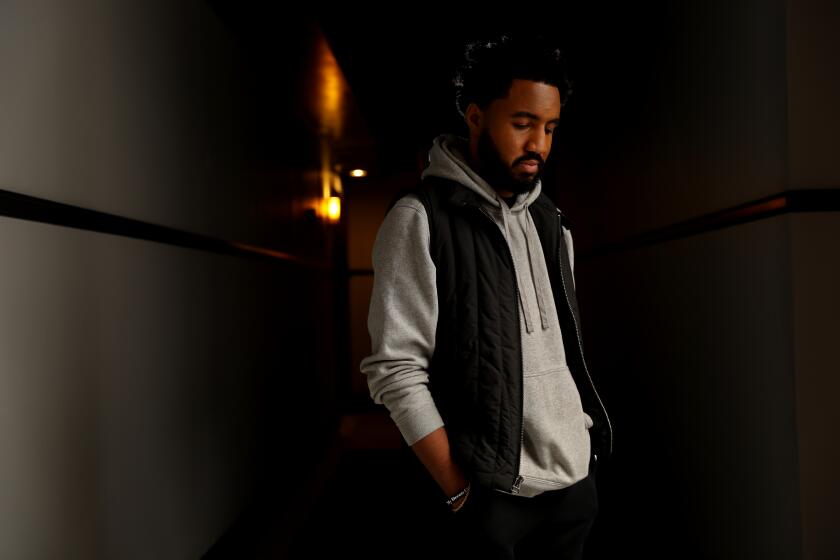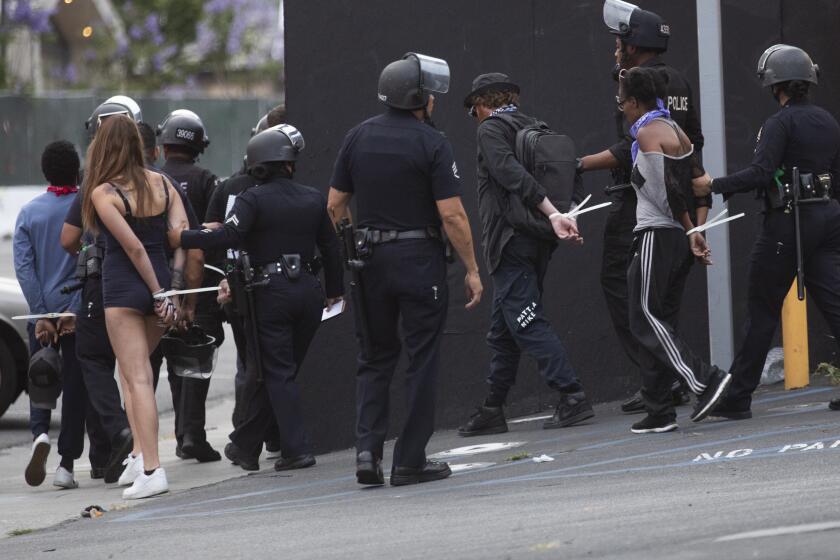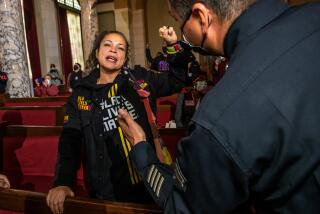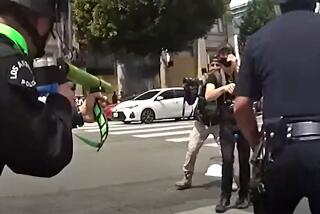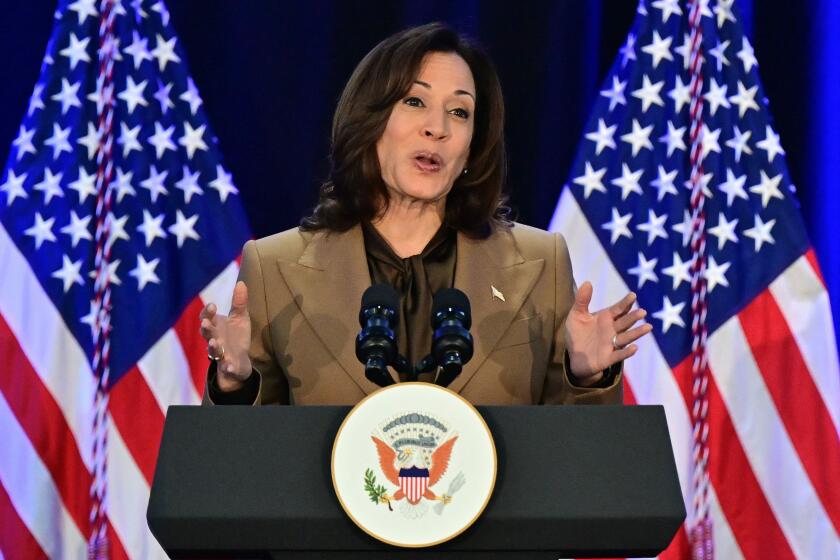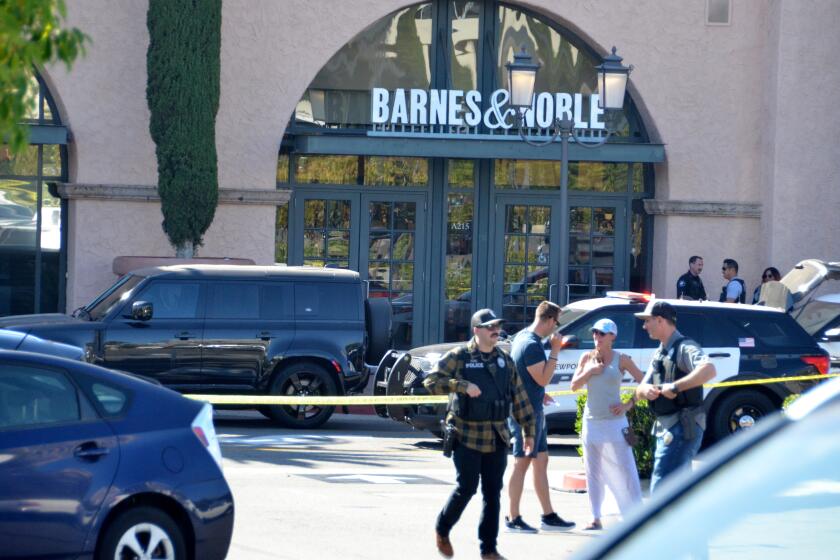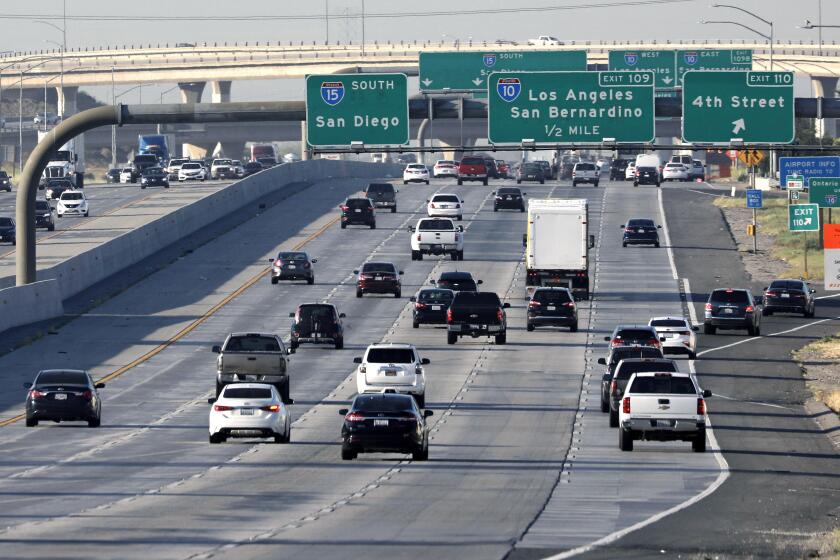LAPD officer found liable for protester’s injury in $375,000 verdict
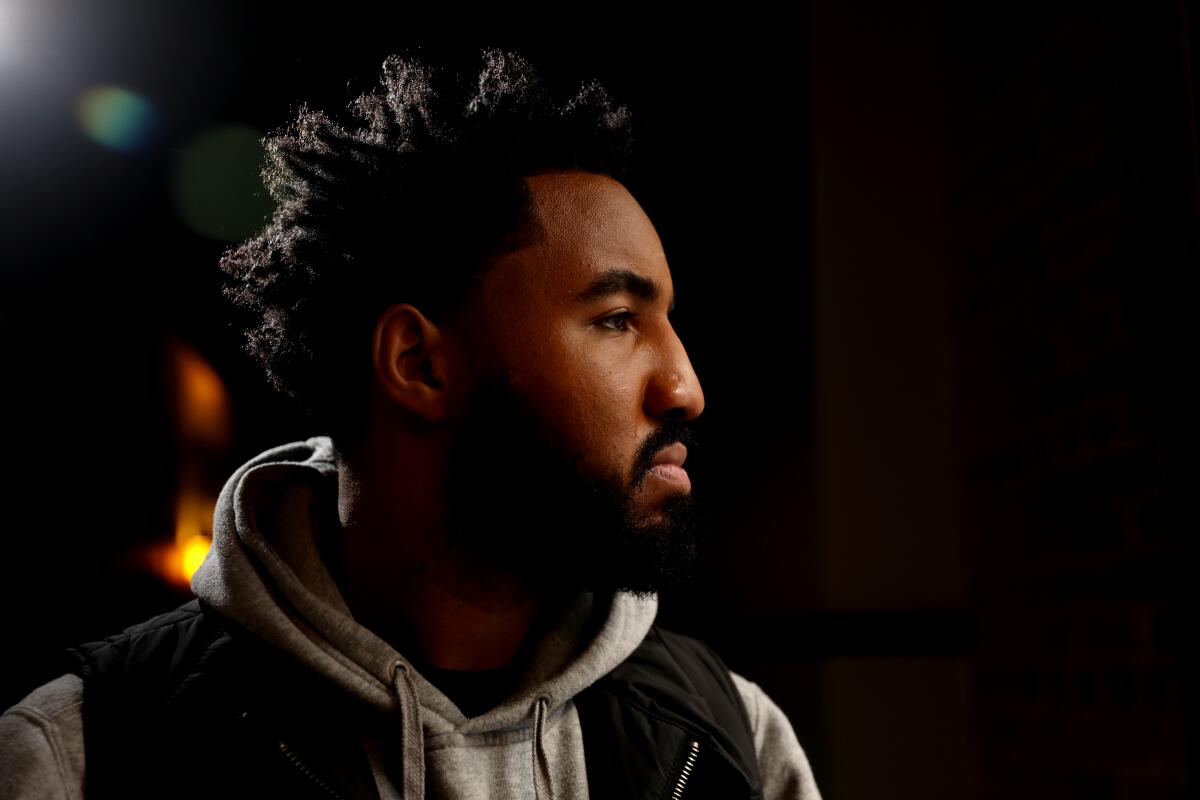
In the first verdict of its kind since mass protests swept Los Angeles in 2020, a federal jury on Thursday found an LAPD officer personally liable, for shooting a protester in the face with a projectile — awarding the man $375,000.
The verdict followed a finding by the jury that the officer, Peter Bueno, violated protester Deon Jones’ civil rights.
Jones listened with his head bowed as a judge read the jury’s decision in a Santa Ana courtroom. Afterward, he said it was “a good day.”
“This victory isn’t just mine. It is for all the folks who historically have went out and protested,” Jones said. “It sends a message that ... law enforcement cannot brutalize folks.”
Bueno stared straight ahead as the verdict was read. His attorney, Janine Jeffery, declined to comment afterward.
LAPD officers have rarely been held accountable for force used during the mass protests against police brutality after the murder of George Floyd, despite hundreds of allegations of excessive force lodged with the department.
Deon Jones’ legal battle to hold the LAPD accountable for wounding him at a 2020 protest has been long and arduous. The city has made it that way.
The jury issued its decision after a week of testimony in which Jones and Bueno offered starkly different descriptions of the chaotic scene where the shooting, which was only partially captured on video, occurred.
Jones, who suffered multiple facial fractures when he was hit with the hard-foam projectile, accused Bueno of firing indiscriminately into crowds in violation of department policy, and of disregarding the clear danger that posed to peaceful protesters like him.
Jones’ attorney, Orin Snyder, said he hoped the case would deter similar force by LAPD officers in the future.
Bueno, assigned to work as a “cover” officer that day, described firing only at specific individuals in the crowd who posed a threat to him and other officers. He denied shooting Jones, and Jeffery questioned whether Jones’ injuries were from a police projectile at all.
The eight-member jury deliberated for about four hours Wednesday afternoon. The jurors reconvened Thursday morning and deliberated for under an hour, coming back with their verdict in Jones’ favor shortly after 9 a.m.
The jury ruled that Bueno had violated Jones’ 4th Amendment rights against unreasonable searches and seizures by law enforcement.
It rejected other claims that Bueno had discriminated against Jones and that he had violated Jones’ 1st Amendment rights.
The jury first awarded Jones $250,000 to compensate for his pain, suffering and associated financial losses since the shooting. It then heard additional arguments as to whether it should award Jones additional “punitive” damages, as punishment for Bueno.
Jeffery asked the jury to be fair to Bueno, a 27-year department veteran who she said is “going to continue to protect and serve” as a member of the LAPD.
Snyder said Bueno violated the trust placed in police officers and should be held accountable.
“When things get chaotic on the streets of Los Angeles,” he said, “that’s when we need police to be at their best.”
After deliberating further, the jury awarded Jones another $125,000.
How the damages will be paid remained unclear Thursday.
The city may choose to indemnify Bueno and cover his costs, but Jeffery said there was “no guarantee” of that given the composition of the L.A. City Council, which includes fierce critics of the LAPD and its response to the protests.
The trial, which focused on Jones’ allegations against Bueno, was the first phase of a broader lawsuit that Jones filed. Future proceedings will consider Jones’ allegations that the LAPD and the city of L.A. were negligent in their oversight of officers during the protests, and could result in more damages to be paid out by taxpayers.
Jones’ win in court stands out for several reasons.
Few individual officers have been disciplined by the LAPD for actions taken during the 2020 protests, despite the hundreds of allegations of excessive force and other misconduct, according to LAPD data reviewed by The Times.
A half-dozen protesters have agreed to end their own litigation against the city in exchange for cash settlements that did not include any acknowledgment of wrongdoing by officers or the city.
Jones had turned down a settlement offer from the city. It turned out to be less than what he was awarded Thursday.
He told his lawyers that he wanted to hold Bueno accountable for shooting him, and the city and the LAPD accountable for allowing excessive force against protesters. He wanted them to be found in the wrong and not to silence him using taxpayer dollars.
Deon Jones’ legal battle to hold the LAPD accountable for wounding him at a 2020 protest has been long and arduous. The city has made it that way.
Jones, 31, who is Black and works in entertainment and brand consulting, was wounded during a massive May 30, 2020, demonstration in the Fairfax district. Activists had gathered to decry the murder of Floyd by police in Minneapolis and the killings of other Black Americans in police custody.
The Times published an article two weeks later outlining Jones’ and other protesters’ claims that police beat them with batons and shot them with projectiles without justification, which prompted an internal investigation by the LAPD that resulted in no discipline for Bueno.
LAPD used violence to quell protests over police brutality, using batons and ‘less lethal’ bullets in ways that probably violated protocols.
Jones filed his lawsuit in December 2020.
Over the span of two days on the witness stand, Jones recounted the sequence of events, telling jurors he felt a moral duty to join others protesting injustice at Pan Pacific Park.
When other protesters set a police car on fire across the street, he and a friend worried that officers would respond with force and moved to the parking lot of a nearby Trader Joe’s.
For the record:
7:32 a.m. March 11, 2023An earlier version of this article said that at a protest on May 30, 2020, in the Fairfax district of Los Angeles, a police car was several blocks away from Deon Jones. The car was across the street from Jones.
Jones was livestreaming the scene with his phone when he noticed an officer, whom he later identified as Bueno, pointing a weapon in his direction. Jones said he turned his face to avoid being struck head-on, and the round struck him in the cheek.
Jones testified that he suffered severe emotional distress and lost job opportunities due to his facial injuries.
“The hurt that you feel because of what happened to you. The flashbacks that you have because of what happened to you. The dreams that you have because of what happened to you,” Jones told jurors. “If I’m being honest, it just flat-out hurts. It’s hurtful. It hurts. It’s something — I didn’t do anything wrong.”
The topic of Black Lives Matter and the worldwide movement against racial injustice that followed Floyd’s death only occasionally surfaced during the trial.
Both Jeffery and Bueno painted a picture for the jury of an out-of-control crowd that pelted officers with rocks and bottles. Jeffery showed video and still images of a squad car on fire and others with windows broken and covered with anti-police graffiti.
“It was chaos out there. I mean, there was people throwing rocks, bottles,” Bueno testified. “They were violent. People coming up to us, they were hostile.”
Bueno admitted that firing a 40-millimeter hard-foam projectile at a person’s head could cause serious injury and that the weapon wasn’t intended for firing into a crowd.
He said he was firing at a “specific target” — an unidentified person who emerged from the crowd and threw a water bottle that landed at his feet.
He recounted how, after he worked more than 20 hours the day before, he and his platoon were ordered to respond to the area of South Fairfax Avenue and West 3rd Street.
He blamed a faulty on/off switch for his body camera being off for 4½ of the six hours that he was on duty that day.
Bueno remains assigned to the LAPD’s Metropolitan Division, an elite unit that, among other duties, handles crowd control.
Jones’ friend Niara Hill broke down in tears on the stand while recounting the moments before and after Jones was shot.
After spending most of the day together at the protest, Hill said, the two of them were briefly separated. She was about 10 feet away when a protester within “touching distance” of Jones hurled a water bottle in the direction of an officer who was holding a green 40-millimeter projectile launcher, she said.
Moments later, that officer fired at Jones, she said.
Later, Jeffery asked Hill whether her social media posts about the case were for publicity.
Hill said no.
“I wanted people to know that there were police officers who were shooting people in the face with rubber bullets,” she said.
In closing remarks, Snyder said that Jones and Hill thought they were doing the right thing by heading to the parking lot after confrontations between some protesters and police turned violent on 3rd Street.
“They did the right thing and removed themselves from the tumult of the street. They did what every parent would want them to do. They sought safety,” Snyder said. “And this is an irony in this case: This is where the police wanted people to go.”
The only defense witness, LAPD tactical flight officer Chad Zipperman, testified that from his vantage point aboard a department helicopter, the situation on the ground had spiraled out of control. He estimated that at one point, the crowd around Bueno and Jones had swelled to 2,000 to 3,000 people, some of whom swarmed and vandalized an MTA bus.
“The vast majority of the crowd that lingered was violent,” he testified.
Jeffery seized on what she deemed were discrepancies in Jones’ description of the officer who fired the 40-millimeter round and of the extent of his injuries. She showed the jury messages from Jones to his friends in the days and weeks after the incident, telling them he was physically OK.
Jones testified that he was never diagnosed with a traumatic brain injury by a physician, saying it was because he lacked health insurance at the time.
Jeffery also argued that there wasn’t enough evidence to show that her client shot Jones, or that Jones was even shot — suggesting that he may have been injured in other ways during the protest.
Snyder accused Bueno and Jeffery of trying to distract the jury by tarnishing Jones’ name without ever explaining why Bueno had fired his weapon — “just attacking, attacking, attacking these young people who came here to share their truth.”
After the award was announced, both Snyder and Jones said their sights were now set on the second part of the case and holding the city and the LAPD accountable, too.
More to Read
Start your day right
Sign up for Essential California for news, features and recommendations from the L.A. Times and beyond in your inbox six days a week.
You may occasionally receive promotional content from the Los Angeles Times.
